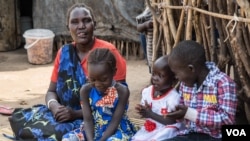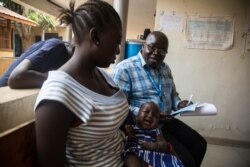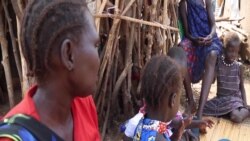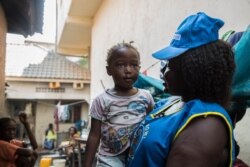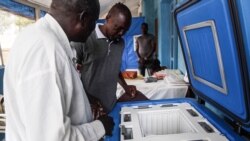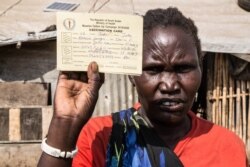Shejirina Moni sits beside her children in front of their makeshift home in a shanty community in South Sudan's capital Juba. Six of her children have died of various illnesses. She’s got three left.
“The first one died at nine months. Another one died at the age of 10 months. Another one died when he was crawling, about three months,” she tells VOA.
Moni’s story highlights a sad fact: Millions of children in South Sudan do not get routine vaccinations. They are vulnerable to preventable illnesses.
While South Sudan is currently free of the coronavirus pandemic alarming the global community, the country is battling a severe measles outbreak, with over 4,700 confirmed cases and 26 deaths since January 2019.
The government of South Sudan has partnered with the World Health Organization, UNICEF, Gavi, the Vaccine Alliance and ONE, the anti-poverty campaign co-founded by Irish musician and celebrity-activist Bono, to carry out a nationwide measles vaccination drive that aims to reach 2.5 million children by April.
The campaign launched in February at the only pediatric medical facility in the entire country – Al-Shabbah Children’s Hospital. Situated in the heart of Juba, it provides healthcare to more than 5,000 people monthly, reaching some of the poorest people in the city.
“We need to boost the vaccination coverage to protect children against measles outbreaks,” says Dr. Makur Matur Kariom, the Ministry of Health’s undersecretary. “Unfortunately, in South Sudan routine vaccination coverage against measles remains low at only 59 percent.”
Public health specialists recommend coverage not to fall below 90 percent. It’s crucial to maintain that standard for measles, which is highly infectious. With poor coverage, outbreaks reoccur.
“[Measles] can cause rashes, eye infection, respiratory infections, diarrhea and even death,” says Dr. Olushayo Olu, the WHO’s South Sudan country representative.
One reason why childhood immunization coverage against measles is low in the country is due to the logistical challenges involved in keeping vaccines at near-freezing temperatures. It's not easy to do in South Sudan - the least electrified country in the world, where temperatures often soar above 40 degrees Celsius.
Al-Shabbah Hospital uses a solar-powered fridge provided by UNICEF.
“We are able to keep these things at the correct temperature in the hospital here. That is the most important thing,” says Dr. Felix Nyungura, the hospital’s executive director. “The public electricity has not yet arrived in our place here. Although in some places it is there. But now we are depending on solar power and electricity from generator. “
UNICEF is helping to restore what is known in healthcare terms as the cold-chain system, which was severely disrupted during the civil war that broke out in 2013.
“With the conflict, more than 50 percent of the cold chain equipment installed in the country were vandalized and some of them looted,” Dr. Patti Samuel, a UNICEF health specialist, tells VOA. He says UNICEF has installed cold-chain equipment, such as refrigerators, to run in about 55 percent of health facilities across the country.
South Sudan faces huge developmental challenges as a young nation mired in historic conflict, economic crisis and grappling with rapid population growth.
Only one percent of the government’s 2019-2020 fiscal budget has been allocated to healthcare. In 2018, it was two percent.
“South Sudan - what are the priorities right now? When your house is on fire, you just want to put out the fire and unfortunately in South Sudan the fire has been burning for so long and some of the basics of development have just not been prioritized,” says Edwin Ikhuoria, ONE’s Africa executive director.
He says governments in Africa do not adequately fund healthcare because politicians don’t see it as a “sexy campaign,” compared to other areas like infrastructure.
“But if health care is not well invested in, you're going to lose a lot in human capital,” he says.
ONE tries to convince governments to increase domestic financing for primary health care and pushes for investments that help to end preventable childhood deaths.
Another reason immunization coverage is low is because people aren’t informed. That’s where community mobilizers like Agnes Anjack Alphonse come in. Volunteering for UNICEF, she’s on the frontline in the effort to get the word out.
“Sometimes I knock on the doors,” she says. “If they did not come and I know that this house has kids, and they did not come, I’ll go knock on the door. ‘Hi, we are doing vaccine, why are you not coming?’ They’ll say, ‘I’m busy.’ I’ll say, ‘can I have your kids and I’ll return them back?’ They’ll say it’s OK.”
Making the rounds in her neighborhood, she meets a mother whose daughter has not been vaccinated and gently persuades her to go to a medical facility.
The efforts are paying off. So far, the vaccination campaign has reached more than a million children, including Shejirina Moni’s.
“I have discovered the importance of vaccination,” she says.
She hopes her daughters, Madelina Padi and Maria Yangi, and son Yoanna, will live long, healthy lives.




